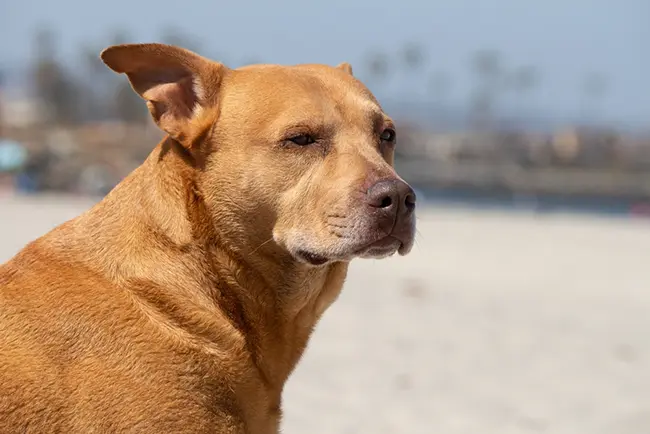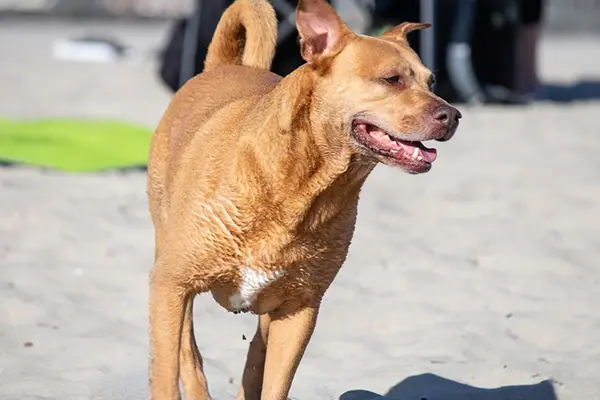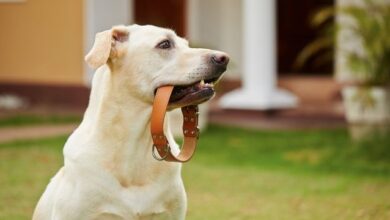
Imagine blending the spirited charm of the Shiba Inu with the robust loyalty of a Pitbull. What do you get? A dog that’s not just a pet but a bundle of surprises on four legs – the Shiba Inu-Pitbull mix. This unique combination brings together the best of two worlds, creating a companion that’s as endearing in appearance as it is in character.
Why might this mix catch your eye, you ask? For starters, it’s about the allure of their looks – a delightful mix of the Shiba’s fluffy allure and the Pitbull’s sturdy grace. But it’s not just about looks; it’s about finding a friend who combines the Shiba’s independence with the Pitbull’s devoted heart. It’s for those who dream of a furry friend who can confidently explore the world yet cherishes every moment spent by your side.
As the popularity of the Shiba Inu-Pitbull mix grows, it’s time we dive deep into their world. From understanding their unique needs to unraveling their personality quirks, this journey is for anyone ready to welcome these lovable hybrids into their homes and hearts. Let’s start this adventure together and discover the joys and challenges of life with a Shiba Inu-Pitbull mix.
Breed Overview

Origins of the Mix
The Shiba Inu-Pitbull mix is a hybrid between the Shiba Inu, an ancient Japanese breed, and the Pitbull, which encompasses a group of breeds originally bred in the United Kingdom and the United States. This mix likely originated in the late 20th or early 21st century, as the popularity of designer dogs began to rise. Breeders and pet owners sought to combine the distinctive traits of the Shiba Inu and Pitbull breeds, aiming for a dog that exhibits a balance of the two breeds’ personalities, physical characteristics, and adaptability as companion animals.
Historical Background of the Shiba Inu and the Pitbull
Shiba Inu: The Shiba Inu is one of the oldest and smallest native breeds of Japan, originally bred for hunting in the dense underbrush of Japan’s mountainous regions. Renowned for their spirited personality, agility, and intelligence, Shiba Inus have been highly esteemed in Japanese culture for centuries. The breed was declared a national treasure of Japan in 1936, underscoring its cultural significance and historical importance.
Pitbull: The term “Pitbull” generally refers to breeds such as the American Pit Bull Terrier, the American Staffordshire Terrier, and the Staffordshire Bull Terrier. These breeds share a common ancestry in the British Isles, where they were initially bred for bull-baiting and later for dog fighting, after bull-baiting was outlawed. Over time, Pitbulls were bred for more peaceful purposes, becoming valued as family pets for their loyalty, affection towards humans, and courage.
How and Why the Mix Might Have Originated
The Shiba Inu-Pitbull mix likely emerged from a desire to create a dog that combines the Shiba Inu’s independent and alert nature with the Pitbull’s strength and loyal demeanor. Such hybrids are often bred with the aim of achieving a pet that embodies the best traits of both breeds, potentially mitigating some of the health issues and temperamental challenges associated with purebreds.
Physical Characteristics
Description of Size, Coat, and Color Variations
The Shiba Inu-Pitbull mix exhibits a wide range of physical characteristics, influenced by the genetic contributions of each parent. Typically, these dogs are medium in size, with adults weighing anywhere from 30 to 50 pounds, depending on the dominant genes. The coat may vary significantly in texture and length, reflecting either the Shiba Inu’s dense, straight fur or the Pitbull’s short, smooth coat. Color variations can be extensive, including but not limited to red, black, white, brindle, and tan, often with markings or patterns inherited from either breed.
Unique Physical Traits Inherited from Both Breeds
This mix tends to inherit the muscular build and strong jaw of the Pitbull, combined with the agile body and keen expression of the Shiba Inu. Their ears can be either the pointed, triangular shape characteristic of the Shiba Inu or the rose-shaped or half-pricked ears typical of the Pitbull. The eyes are usually alert and expressive, reflecting the intelligence and spirited nature of both breeds.
Temperament and Personality
Behavioral Traits
The Shiba Inu-Pitbull mix inherits a complex blend of traits from both parent breeds, leading to a rich tapestry of behaviors that can vary widely among individuals. Commonly observed characteristics include high energy levels, marked loyalty, a strong sense of independence, and an instinctive protectiveness over their family.
Energy Levels: This mix tends to display a vibrant energy that requires regular outlets for physical activity. Their zest for life and playfulness make them engaging companions, though their energy needs to be channeled through appropriate activities to prevent boredom and associated destructive behaviors.
Loyalty: Inherited from both the Shiba Inu and the Pitbull, this hybrid demonstrates profound loyalty to their family members, often forming strong, inseparable bonds with their primary caregivers.
Independence: The Shiba Inu’s influence brings a degree of independence not always seen in Pitbulls. This can manifest as a confident ability to entertain themselves but may also pose challenges in training if not managed with a firm, consistent hand.
Protectiveness: With a Pitbull parentage, the mix may exhibit protective behaviors, making them vigilant watchdogs. Proper socialization is crucial to ensure this trait does not evolve into overt aggression.
Compatibility with Families
Suitability for Homes with Children and Other Pets: The Shiba Inu-Pitbull mix can thrive in a family environment, provided they have been properly socialized from a young age. They generally exhibit a kind and patient demeanor towards children but should always be supervised, as with any dog. Their compatibility with other pets can vary, depending on the individual dog’s personality and their socialization experiences.
Health and Care
Health Concerns and Lifespan
Common Health Issues Inherited from Both Breeds: This hybrid may inherit health issues common to both Shiba Inus and Pitbulls, such as hip dysplasia, allergies, and certain heart conditions. Regular health check-ups and proactive care are vital to address these concerns early.
Expected Lifespan: The Shiba Inu-Pitbull mix generally enjoys a lifespan of approximately 12 to 15 years, influenced by their health status, lifestyle, and genetics.
Diet and Nutrition
A balanced diet is crucial for the Shiba Inu-Pitbull mix, tailored to their age, weight, and energy level. High-quality dog food, possibly supplemented with vet-approved human foods, can support a healthy weight and overall well-being. Avoiding foods known to cause allergies or sensitivities in these breeds is advisable.
Exercise Requirements
Importance of Regular Exercise and Mental Stimulation: Regular physical activity and mental engagement are non-negotiable for the Shiba Inu-Pitbull mix, helping to maintain their physical health and prevent behavioral issues.
Suggested Activities: Activities that cater to their intelligence and physical capabilities include long walks, fetch, agility training, and puzzle toys. These not only provide exercise but also strengthen the bond between the dog and their family.
Training and Socialization
Training Tips
Effective training of a Shiba Inu-Pitbull mix requires a well-thought-out strategy that leans heavily on positive reinforcement and consistency. This breed mix responds best to rewards-based training, where desirable behaviors are rewarded with treats, praise, or playtime, reinforcing their repetition. Consistency in commands, expectations, and consequences helps establish a routine and understanding, facilitating a smoother training process. Given the Shiba Inu’s independence and the Pitbull’s eagerness to please, blending firmness with patience is key to navigating the training sessions successfully.
Socialization Needs
Importance of Early Socialization: Early socialization is paramount for the Shiba Inu-Pitbull mix, as it helps mitigate potential future aggression and fearfulness. Introducing them to a variety of people, environments, and other animals from a young age helps develop a well-adjusted, confident adult dog.
Tips for Successful Socialization: Gradual exposure to different stimuli in a controlled, positive manner can significantly enhance socialization efforts. Puppy training classes offer an excellent opportunity for social interaction, as do regular walks in diverse environments. Positive encounters with strangers and other pets, accompanied by rewards, solidify the socialization experience, fostering a sociable and friendly demeanor.
Adoption and Care
Finding a Shiba Inu-Pitbull Mix
Tips on Adopting from Shelters, Rescues, or Reputable Breeders: Prospective owners should consider adopting a Shiba Inu-Pitbull mix from shelters or rescue organizations as a first option, providing a home to a dog in need. If choosing to adopt from a breeder, verifying the breeder’s credibility and commitment to the health and well-being of their dogs is essential. Reputable breeders should provide comprehensive health clearances for both parent breeds and be transparent about the puppy’s health history and conditions.
Preparation for Bringing Your Dog Home
Essential Supplies: Preparing your home for a new dog involves acquiring essential supplies, including a high-quality dog bed, food and water bowls, a collar and leash, dog food, chew toys, and grooming tools. Creating a safe, welcoming space for your new pet helps ease their transition into their new environment.
Ongoing Care and Support:
Regular veterinary check-ups are critical to monitoring the health of your Shiba Inu-Pitbull mix. Keeping up to date with vaccinations, flea and tick prevention, and deworming schedules helps prevent common diseases and health issues. Additionally, establishing a routine for regular exercise, dental care, and grooming contributes to their overall health and happiness.
Conclusion
Owning a Shiba Inu-Pitbull mix is a journey filled with both joys and challenges, reflecting the diverse and complex nature of this unique hybrid. These dogs bring into their homes a vibrant blend of the Shiba Inu’s spirited independence and the Pitbull’s loyal, loving demeanor. Their intelligence, loyalty, and energy make them wonderful companions, capable of providing endless affection and entertainment. However, prospective owners must be prepared for the challenges that accompany these traits, including the need for consistent training, socialization, and the potential for strong-willed behavior.
The decision to welcome a Shiba Inu-Pitbull mix into your life carries with it a significant responsibility. It requires a commitment to understanding and meeting the specific needs of the breed mix, from their physical exercise requirements to their mental stimulation and health care. Ensuring a happy, healthy life for these dogs means investing time, effort, and resources into their upbringing, care, and well-being.
FAQs
Q: How much exercise does a Shiba Inu-Pitbull mix need? A: A Shiba Inu-Pitbull mix requires regular, daily exercise to satisfy their high energy levels. This should include walks, play sessions, and opportunities for mental stimulation. Aim for at least one hour of physical activity per day, though this may vary based on the individual dog’s health, age, and energy level.
Q: Are Shiba Inu-Pitbull mixes good with children? A: Yes, with proper socialization, Shiba Inu-Pitbull mixes can be excellent companions for children. They are known for their loyalty and protective nature. However, interactions between any dog and young children should always be supervised to ensure safety for both the child and the dog.
Q: What are the common health issues in Shiba Inu-Pitbull mixes? A: Common health concerns may include hip dysplasia, allergies, and certain heart conditions, inherited from their parent breeds. Regular veterinary check-ups and a healthy lifestyle can help manage these risks.
Q: Can a Shiba Inu-Pitbull mix live in an apartment? A: While it’s possible for a Shiba Inu-Pitbull mix to adapt to apartment living, they thrive best in environments where they have ample space to move and play. If living in an apartment, daily walks and regular trips to the park are essential to meet their exercise needs.
Q: How do I ensure my Shiba Inu-Pitbull mix is well-socialized? A: Early and ongoing socialization is key. Expose your dog to a variety of people, animals, and situations from a young age. Positive reinforcement, puppy classes, and controlled play dates can also contribute to a well-socialized dog.



